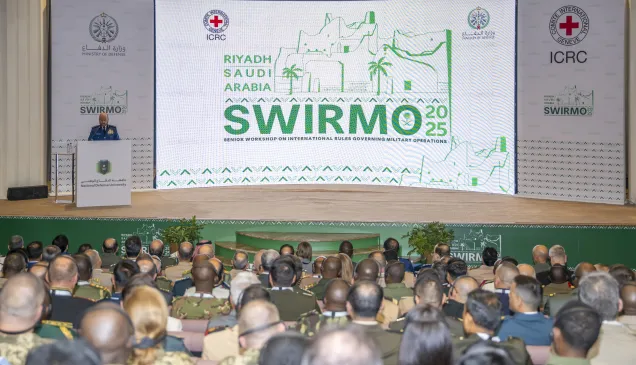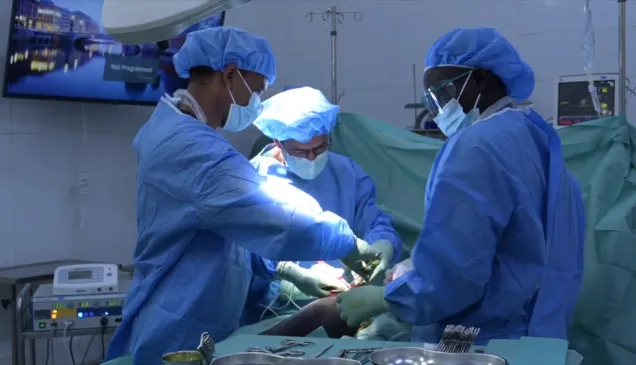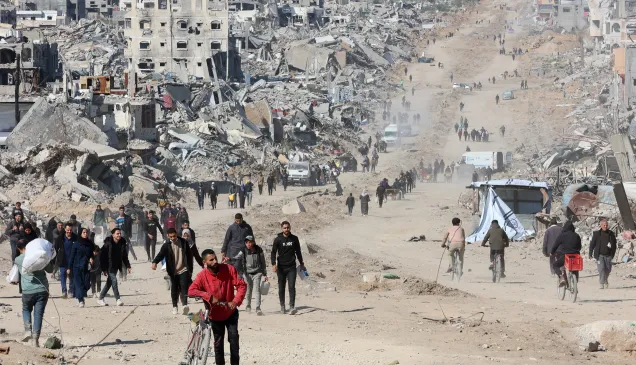The ICRC would like to draw the attention of the Human Rights Council to the specific forms of violence to which women and girls may be subjected during armed conflict or in other situations of violence and the specific measures that could be taken to increase their protection, including by strengthening prevention and protection frameworks.
Violence against women in war – a major humanitarian concern
In the Central African Republic, South Sudan, Mali or Syria – to name but a few countries of particular concern in this respect – millions of women and girls bear the brunt of today's war, especially as the principle of distinction between combatants and civilians is increasingly ignored and women become deliberate targets of weapon-bearers. The use of sexual violence in many conflicts renders women and girls particularly vulnerable during those times. The environment of war also hampers their access to food, safe drinking water and health care. It may leave them as the head of the household, caregiver and sole breadwinner for their family. They often have to travel long distances to find water, food, firewood, medicines and other basic necessities, thereby exposing themselves to further risks. Yet women and girls continue to demonstrate remarkable resilience and strength even in those most daunting circumstances.
The vulnerability of women and girls increases when they are compelled to leave their homes and communities. Regardless of how they are classified – as migrants, refugees, internally displaced persons or in any other group – they and their children are exposed to an increased risk of violence and exploitation while travelling, including the danger of being detained, sexually abused or abducted by weapon-bearers, especially if they are unaccompanied. In camps and the surrounding areas, women and girls face similar harrowing risks as their security and safety remain considerably hampered. In addition to being perceived as easy targets, some women and girls may, in extreme cases, resort to survival sex, i.e. engaging in sexual activities in exchange for food, essential items or protection.
Better prevention is necessary – The ICRC urges all States to respect and uphold their obligations under international law. Better implementation of and compliance with international law, particularly international humanitarian law (IHL), can prevent violence against women and girls in connection with armed conflict or other situations of violence and ensure better protection.
IHL requires humane treatment to be given to the wounded and sick, prisoners and civilians caught up in a conflict, without any "adverse distinction" based on sex, race, nationality, religion, political opinions or any similar criteria. This general protection is provided by the four Geneva Conventions (1949) and their Additional Protocols (1977), as well by customary humanitarian law. The general provisions of IHL also forbid hostage-taking and the use of human shields. In recent conflicts these provisions have been violated, particularly with women and children being used to shield combatants from attack. IHL further requires that expectant mothers and mothers of young children, in particular nursing mothers, be treated with particular care. This applies, for example, to the provision of food, clothing, medical assistance, evacuation and transportation.
As men make up the vast majority of those who go missing, women are particularly exposed to the separation of family members and the suffering caused by the unknown fate of a missing relative, both during and after an armed conflict. IHL provides families with the right to know the fate of their missing relatives and obliges parties to armed conflicts to take all feasible measures to account for persons reported missing.
IHL states that women must be "especially protected" from sexual violence. This includes rape, forced prostitution and any other form of sexual violence, all of which constitute international crimes. All States have an obligation to make these acts crimes under their national legislation. Where rape and other serious forms of sexual violence occur during armed conflict, governments are required to carry out the necessary investigation, prosecution and punishment of perpetrators.
As parties to the Geneva Conventions and other IHL treaties, the ICRC urges all States to include better respect for women and girls at all times, particularly in times of armed conflict and other situations of violence, in their national legislation provisions. This is an important step in cementing the protection granted by any framework developed. We would like to emphasize the importance of improving access to and the delivery of health care in armed conflict and other situations of violence for all persons, but especially for women and girls. It is imperative that States, their armed forces and all others exercising authority recognize that violence which disrupts the delivery of health care presents a serious and widespread humanitarian challenge, one that requires more focused attention from States throughout the world.
Responding to women's and girls' needs – When violence is directed against women and girls in connection with an armed conflict or another situation of violence, responses should be coordinated among all stakeholders, i.e. States, the United Nations and humanitarian organizations. They should also be multifaceted, comprehensive and aim at sustainability; hence the importance of the frameworks mentioned in the Special Rapporteur's report.
Most importantly, such responses should address women's and girls' needs. More effort needs to be focused on developing comprehensive methodological tools and mechanisms that are intended to accurately assess the needs of women and girl victims of violence in connection with armed conflict or other situations of violence so as to enable the establishment of more specifically tailored responses that take women's perspectives and capacities into consideration. The ICRC wishes to reaffirm the importance of ensuring women's active participation in their own solutions, including self-protection mechanisms and livelihood opportunities.
The ICRC has developed a multidimensional approach to identifying and addressing the specific vulnerabilities of women and girls in armed conflict and other situations of violence. The aim is to draw particular attention to the needs of specific protected persons and those considered most vulnerable, including pregnant women, children, female-headed households and widows. By integrating a gender analysis into all planning, implementation and evaluation phases of its responses, the ICRC's goal is to ensure that women affected by armed conflict benefit from appropriate protection and assistance. Wherever possible, ICRC delegations work together across regions and cooperate closely with National Red Cross and Red Crescent Societies to develop a better understanding and knowledge of the environment.
The ICRC wishes to stress its full support for the Special Rapporteur. It is available to provide its assistance in the conduct of her mandate.



